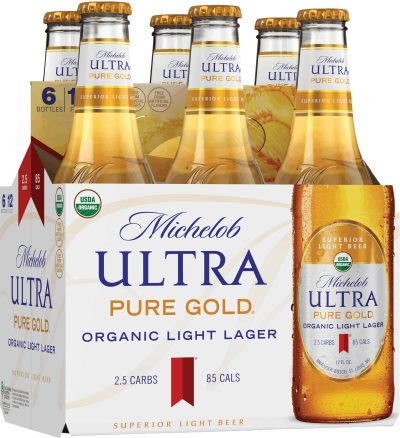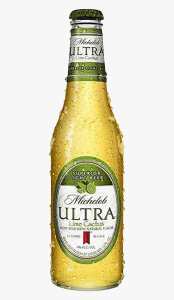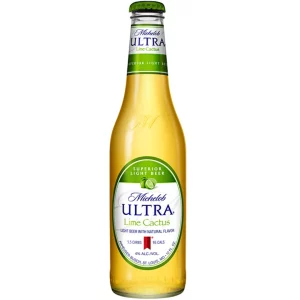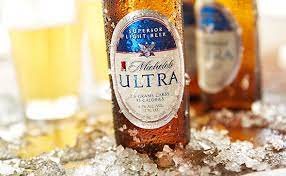Michelob Ultra is marketed as a low-calorie, low-carbohydrate option for those who want to enjoy a beer without consuming too many calories or carbs. It is also a good option for those who want to consume alcohol in moderation, but it is important you know how much alcohol is in Michelob ultra.
Michelob Ultra is a light beer that contains around 95 calories and 2.6 grams of carbohydrates per 12-ounce serving. It is brewed with barley, hops, and other ingredients and contains 4.2% alcohol by volume (ABV). This is slightly lower than the average ABV of most beers, which is around 5%.
The alcohol in Michelob Ultra can get someone drunk. Michelob Ultra is a light beer that contains 4.2% alcohol by volume, which is the same amount of alcohol as a typical beer.
Consuming too much alcohol can lead to drunkenness and potentially harmful effects on the body. It is important to drink responsibly and not exceed the recommended limits for alcohol consumption.
What is Michelob Ultra?
Michelob Ultra is a beer brand that falls into the category of light beer. It’s brewed by Anheuser-Busch InBev, one of the largest brewing companies in the world. What distinguishes Michelob Ultra from other beers is its focus on being low in carbohydrates and calories.
Here’s a more detailed breakdown:
- Brewing Process: Like most beers, Michelob Ultra is brewed using traditional brewing methods. It starts with the selection of high-quality ingredients such as malted barley, hops, yeast, and water. The brewing process involves mashing, lautering, boiling, fermenting, conditioning, and packaging.
- Low Carbohydrates: Carbohydrates in beer primarily come from the grains used in brewing, such as barley. During fermentation, yeast consumes these carbohydrates and converts them into alcohol and carbon dioxide. Michelob Ultra is brewed to contain fewer carbohydrates compared to regular beers. This appeals to consumers who are following low-carb diets or watching their carbohydrate intake for health reasons.
- Low Calories: Calories in beer primarily come from the alcohol content and any residual sugars left after fermentation. Michelob Ultra is designed to have a lower calorie content compared to standard beers. This is achieved through various brewing techniques, including using less malt or adjuncts with lower sugar content. By reducing the calorie count, Michelob Ultra targets consumers who are mindful of their calorie consumption but still want to enjoy a beer.
- Marketing and Branding: Michelob Ultra’s marketing strategy heavily emphasizes an active lifestyle and wellness. It’s often associated with fitness activities such as running, cycling, yoga, and other outdoor sports. The brand sponsors events like marathons and triathlons, positioning itself as the beer of choice for health-conscious individuals who want to balance their enjoyment of beer with their fitness goals.
- Product Line: Over the years, Michelob Ultra has expanded its product line to include different variations, such as flavored versions like Lime Cactus and Pure Gold, which is made with organic grains. These variations cater to different consumer preferences while still maintaining the brand’s focus on low carbs and calories.
Michelob Ultra is a light beer brand known for its low carbohydrate and calorie content. It’s brewed using traditional methods but with a focus on reducing carbohydrates and calories to appeal to health-conscious consumers. Its marketing strategy aligns with active lifestyles, making it popular among those who want to enjoy beer while maintaining their fitness goals.
Alcohol Content in Michelob Ultra
Michelob Ultra typically has an alcohol by volume (ABV) content of around 4.0% to 4.2%. Alcohol by volume (ABV) is a standard measure used worldwide to quantify the amount of alcohol (ethanol) in an alcoholic beverage. It represents the percentage of alcohol in the total volume of the beverage.
For Michelob Ultra, the ABV falls within the range of most standard beers. This means that, despite being low in calories and carbohydrates, Michelob Ultra still provides a similar alcohol content to many other beers on the market.
The moderate alcohol content of Michelob Ultra allows consumers to enjoy its refreshing taste while still being mindful of their overall alcohol intake. However, it’s essential to drink responsibly and be aware of the effects of alcohol on the body, regardless of the beverage’s ABV.
Comparison with Other Beers
When comparing Michelob Ultra with other beers, particularly traditional or standard beers, several key differences stand out:
- Calories and Carbohydrates: Michelob Ultra is known for its significantly lower calorie and carbohydrate content compared to most traditional beers. While the exact numbers can vary, Michelob Ultra typically contains around 95 calories per 12-ounce serving and only a few grams of carbohydrates, making it a popular choice for those watching their calorie and carb intake.
- Alcohol Content: The alcohol by volume (ABV) of Michelob Ultra falls within the range of most standard beers, typically around 4.0% to 4.2%. This means that despite its lighter profile in terms of calories and carbs, Michelob Ultra still offers a similar alcohol content to many other beers.
- Flavor Profile: Michelob Ultra is often praised for its crisp, clean taste with subtle malt and hop flavors. It’s designed to be refreshing and easy to drink, appealing to a wide range of consumers. Traditional beers may have more pronounced malt or hop characteristics, depending on the style, and may offer a broader range of flavor profiles, including variations like stouts, porters, IPAs, and ales.
- Marketing and Branding: Michelob Ultra’s marketing strategy focuses heavily on health and fitness, positioning it as a beer for active lifestyles. This sets it apart from many other beers, which may not emphasize health and wellness to the same degree. The branding of Michelob Ultra often features imagery related to sports, outdoor activities, and healthy living.
- Variety: While Michelob Ultra primarily offers a light lager, the brand has expanded its product line to include flavored variations like Lime Cactus and Pure Gold, providing additional options for consumers seeking different flavor experiences. Traditional beer brands may also offer a variety of styles and flavors to cater to diverse preferences.
Overall, Michelob Ultra distinguishes itself from other beers through its focus on low calories and carbohydrates, its alignment with health and fitness lifestyles, and its crisp, refreshing taste. While it may not offer the same range of flavors as traditional beers, it has carved out a niche in the market for those seeking a lighter beer option without sacrificing taste or alcohol content.
Can Michelob ultra get you drunk?
Yes, drinking too much Michelob Ultra can certainly cause you to become drunk. Michelob Ultra is an alcoholic beverage, and like all alcoholic beverages, it contains ethanol, which is a substance that can make you drunk.
It is generally not safe to get drunk on any type of alcohol, including Michelob Ultra or any other type of beer. Alcohol is a central nervous system depressant, which means it can slow down the function of the brain and other vital organs.
Drinking too much alcohol can impair your judgment, coordination, and reaction time, which can lead to accidents and injuries. In severe cases, alcohol poisoning can occur, which can be life-threatening.
Effects of Alcohol Consumption
Does Michelob ultra cause belly fat?
Drinking Michelob Ultra or any other type of beer is not likely to cause belly fat directly. Belly fat, also known as abdominal obesity, is caused by consuming more calories than your body uses, leading to the accumulation of fat in the abdominal area.
Beer, like any other type of alcohol, contains calories, and drinking too much beer can contribute to weight gain and potentially lead to belly fat. However, moderation is key, and drinking Michelob Ultra in moderation is not likely to cause belly fat.
To avoid gaining weight and developing belly fat, it’s important to maintain a balanced diet and engage in regular physical activity.
Conclusion
If you need to know how much alcohol is in Michelob ultra, then you have the right information on this page. It is generally considered safe to consume alcohol in moderation, defined as up to one drink per day for women and up to two drinks per day for men.
However, this can vary depending on a person’s age, weight, and overall health, so it is always best to consult with a healthcare provider to determine what is safe for you. In general, it is important to avoid excessive alcohol consumption, as it can have negative effects on your health and well-being.




